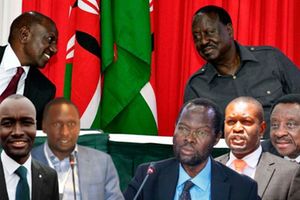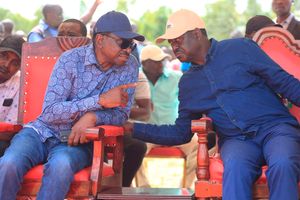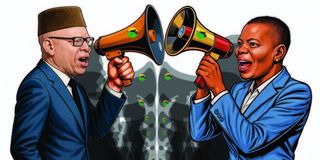
President William Ruto’s administration is coming under increasing scrutiny over what critics describe as a “bloated” and “duplicative” network of communication and advisory personnel.
The latest in this communication conundrum is the entry of Ms Farida Karoney, who was a Cabinet Secretary in Uhuru Kenyatta administration.
Ms Karoney promised to provide more details on her new strategic communication role but had not done so by the time of publishing this article.
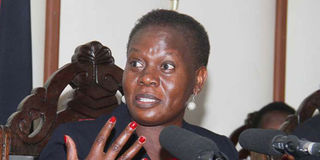
Farida Karoney.
Observers say the sheer number of spokespeople, advisors and communication officials of all shades has created confusion, overlapping roles, and a ballooning wage bill with the ever-expanding Executive Office of the President at the centre of it.
This is in addition to the official State House Spokesperson and government spokesperson roles that already exist within the Ministry of Information, Communications and the Digital Economy (ICT), Each ministry also has public servants employed as communication officials besides Cabinet Secretaries being allowed to hire consultants.
Ms Karoney will reportedly be helping with strategic communication across all ministries. The official Government spokesperson post is held by Mr Isaac Mwaura with Mwanaisha Chidzuga as his deputy yet there is also the National Communication Centre whose director general is ex-police spokesperson Charles Owino.
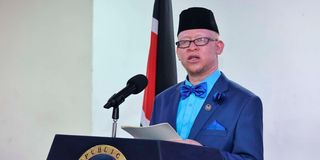
Government Spokesperson Isaac Mwaura addresses journalists at his office on Wednesday, November 15.
At State House, Mr Hussein Mohamed is the official Spokesman with Mr Munyori Buku heading the Presidential Communication Service (PCS) which includes a list of senior officials. PCS succeeded President Kenyatta’s troubled Presidential Strategic Communication Unit that, in turn, had taken over from Daniel Moi’s Presidential Press Service.
Emergence of new media
Mr Mwaura, the official government spokesperson, says that the emergence of new media, including social media, has necessitated the need for the specialisation of communication teams to help the government disseminate information more effectively.
“The State House team covers the person of the President on a daily basis. This is the mandate of the Presidential Communication Service and State House Spokesperson. The roles are well defined,” Mr Mwaura told the Weekly Review
Mr Mwaura, a former Senator, added that he speaks on behalf of the government. “My office coordinates all ministries, departments and agencies in terms of day-to-day and weekly communication. The others from the Ministry of ICT support the presidency in executing this mandate,” Mr Mwaura said
But sources within government circles pointed to instances where officials have issued conflicting statements on the same issue—highlighting the lack of coordination.
Senior officials are said to be jostling for influence and media limelight, often pushing personalised narratives instead of unified government messaging.
The concerns, Weekly Review has established, influenced the move by the ICT ministry to draft a Government Communication Strategy (GCS) 2024-2027 to enhance a ‘One Government, One Voice’ strategy,’ to improve efficiency in communication and avert numerous blunders.
Opposition chief Raila Odinga’s ODM party, which entered into a Memorandum of Understanding (MoU) with President Ruto’s UDA last month has alleged numerous blunders committed by state officials that have made it difficult to trust the Kenya Kwanza administration.
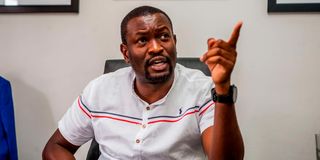
Nairobi County Senator Edwin Sifuna during an interview in his office.
ODM Secretary General Edwin Sifuna recently publicly fired a salvo at president Ruto in the presence of Mr Odinga over what he termed as unending government blunders that make it difficult for his side to uphold their MoU.
Commit blunders
“Working with you is very difficult Mr President. Some of your people in government commit blunders every day. The Nakuru drama where children (from Butere Girls) were teargassed and not allowed to do their plays was a very unfortunate incident and you need to read the riot act to them,” Mr Sifuna said.
ICT CS William Kabogo says that the GCS seeks to cure the communication challenges. “The Government Communication Strategy is necessitated by lack of a common approach in executing government communication, resulting into incoherent, inconsistent and discordant delivery of government messaging,” Mr Kabogo says.
He adds: “The consequences of such inconsistencies include limited public support towards government policies, programmes and activities, poor narrative of government development milestones and mixed public attitude towards the government.”
Mr Kabogo said that a coordinated government communication system will ensure that policies, programmes and interventions are well-articulated to the public, thus eliciting informed engagement and galvanising support.
At the height of the Gen Z protests in June 2024, President Ruto attributed Kenyans' strong resistance to the Finance Bill, to a lack of proper communication, despite the many communication layers under his administration.
According to Dr Ruto, his communication team may have failed to provide adequate information regarding some of the new tax measures introduced in the Bill. The under-pressure president eventually declined to sign the Bill into law.
“We did not explain ourselves better, I am sure my communication team failed, and our communication architecture did not deliver. The message did not get out to the people,” he said.
However, some State officials argue that the growing communication and advisory network reflects the complexity of modern governance and the need for rapid response in a fast-paced digital age.
“On communication, we are no longer in the era of a single story as this space has been democratised. Never before have we witnessed as many TV, radio, and newspaper outlets. Social media has also given the masses a means to 'broadcast' their news using their accounts on various platforms and communication is now thus individualised and personalised, necessitating the specialisation of communication teams to help the government disseminate information more effectively,” Mr Mwaura says.
However, critics contend it’s a symbol of wastage, undergirded by rewarding political allies.
Prof Gitile Naituli of the Multimedia University of Kenya says despite of President Ruto’s large communication empire, its structure is “inherently flawed,” thus unable to function properly.
“There is no clear hierarchy, no unified messaging strategy, and often, overlapping mandates. The result? Confusion, contradictions and a growing public perception that the administration is talking over itself — and over the heads of the very people it seeks to persuade,” says the governance and management expert.
Taxes are rising
He adds: “But there is also a moral dimension to this issue. In a time when Kenyans are being urged to tighten their belts, when public services are strained, and when taxes are rising, the image of a bloated, ineffective communication team smacks of insensitivity.”
Prof Naituli adds that the irony is that effective communication doesn't require a multitude of messengers. “It requires coherence, authenticity, and trust — all qualities that no number of press briefings or tweets can fabricate. If the President’s message isn't landing, perhaps it's not the messengers who are failing. Perhaps it’s the message itself — or worse, the reality behind it.”
But while championing austerity, President Ruto continues to swell, not only his communication team but also, a band of advisors, casting a spotlight on his trail of overlooked pledges.
In a recent reshuffle, President Ruto instituted changes that he said were to accelerate the implementation of his administration's Bottom-Up Economic Transformation Agenda.
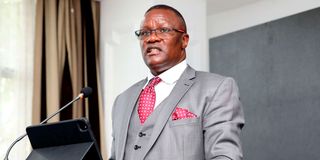
Deputy Chief of Staff, Performance and Delivery Management Eliud Owalo.
Prof Edward Kisiang'ani, who was stripped of his role as Principal Secretary in the State Department of Broadcasting and Telecommunication, was appointed senior advisor and member of the President's Council of Economic Advisors led by Dr David Ndii. He joins other former Cabinet secretaries — Eliud Owalo and Moses Kuria — who have been given a soft landing at State House.
The President has also appointed Mr Jaoko Oburu as Adviser, Economic Empowerment and Sustainable Livelihoods. He is the son of Siaya Senator Oburu Oginga.
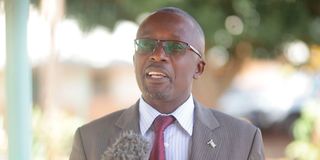
Mr Jaoko Oburu.
This string of new appointments, however, comes after President Ruto announced in 2024 a list of austerity measures to cut down government spending. Dr Ruto promised to reduce the number of advisors in government by at least 50 per cent with immediate effect but has not lived up to this pledge.
He also announced the removal of budgets allocated to offices of the First Lady, the second Lady and the spouse to the Prime Cabinet Secretary.
Four months later, in December 2024, he reneged on his vow and appointed four more advisers to the Council of Economic Advisors.
Among them was former Public Service Cabinet Secretary Moses Kuria. The other three were Prof Adams Oloo — who however resigned to take up a role in the Independent Electoral and Boundaries Commission (IEBC) selection panel job — Joe Ager and Dr Silvestor Kasuku. They are all close allies of the President’s new-fond ally Mr Raila Odinga. The team of economic advisors led by Dr Ndii now has 12 members.
Other members of the Council are Augustine Cheruiyot (Agribusiness and Finance), Prof Abdi Guliye (Animal Production), Dr. Dominic Menjo (Food security and Animal production), Dr. Nancy Laiboni, (Agricultural Economics), Henry Kinyua (Crops/value chains) and Steven Otieno (Cooperatives).
But Mr Mwaura, the Government Spokesman, insists that “every advisor has their role well defined as per the mandate of the office,” and that the nature of the broad-based government has prompted the president to have “more shades of political opinions, regions, and expertise as possible.”
Economic Advisors
“The Council of Economic Advisors helps in thinking through the macroeconomics and other policies to help realise the Bottom Up Economic Transformation Agenda. Some advisors like Kasuku Sylvester are well versed in matters infrastructure, having founded Lapsset as CEO,” he says.
The President, he adds, has deliberately ensured that his team builds synergy in order to deliver on government promises to Kenyans.
“It should be remembered that the 2022 general elections were the least tribal and issue-based in the recent history of our Republic. The broad-based government is a fulfilment and perpetuation of this aspiration,” Mr Mwaura added, in his defence of the diverse advisers appointed by President Ruto.
The growing number of advisers had even sparked a heated debate, with Kenyans questioning the cost of keeping such a large number on the payroll.
Dr Ndii was at one time pressed and forced to defend the issue after reports revealed that their annual bill cost taxpayers Sh1.1 billion.
“Advisers are not paid entertainment allowance. The budget is for meetings. Our job entails policy development and implementation oversight. That means convening meetings typically 3-4 per day with 10-30 people each. The biggest facility in our office is boardrooms,” Dr Ndii replied to a user on the social media platform X.
But Prof Naituli says that the country is witnessing a deeper governance issue.
“The inflation of state functions is not for efficiency, but for patronage. Each new appointment serves a political purpose — rewarding loyalty, balancing ethnic or regional interests, or managing internal party dynamics — rather than solving an actual communication and advisory gap,” he says.

